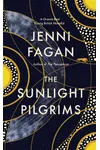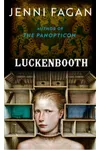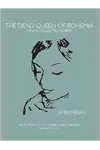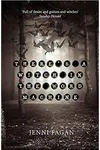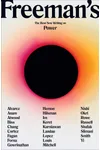Picture a Scottish storyteller who spins raw, lyrical tales from the fringes of society—meet Jenni Fagan! A novelist and poet, Fagan has captivated readers with her debut novel The Panopticon and her haunting gothic work Luckenbooth. Her prose, infused with poetic grit, shines a light on the marginalized, making her a standout voice in contemporary literature.
Born in 1977, Fagan’s life story is as compelling as her fiction. Raised in Scotland’s care system, she faced unimaginable challenges, yet her love for storytelling became her lifeline. Today, she’s celebrated for her vivid narratives and fierce advocacy for the voiceless, blending poetry and prose in a way that’s uniquely her own.
The Making of Jenni Fagan
Jenni Fagan’s early life was marked by instability, growing up in the Scottish Local Authority care system with over 27 placements by age 16. She faced failed adoptions, homelessness, and constant upheaval, moving 26 times as a child. Yet, books and writing offered solace. At seven, she began penning diaries and poems, finding her voice amidst chaos. Her passion led her to a first-class BA from the University of Greenwich, followed by a PhD in Structuralism from the University of Edinburgh, proving her resilience and autodidactic spirit.
Fagan’s career began with poetry and playwriting, earning early recognition with a 10-minute play for the Traverse Theatre. Her shift to novels cemented her reputation, with her debut The Panopticon earning a spot on Granta’s 2013 Best Young British Novelists list. Her punk and grunge band days added a rebellious edge to her creative journey, shaping her fearless storytelling.
Jenni Fagan’s Unforgettable Stories
Fagan’s works are a tapestry of raw emotion, poetic lyricism, and social commentary. Her debut, The Panopticon (2012), follows Anais Hendricks, a fierce teen navigating a care system that mirrors Fagan’s own experiences. Critics praised its vivid prose, with The New York Times calling her the “Patron Saint of Literary Street Urchins.” The novel’s unflinching look at marginalized youth set the tone for her career.
In The Sunlight Pilgrims (2016), Fagan explores a transgender teen’s life in a Scottish caravan park during a climate crisis. Its sparkling prose and tender relationships earned accolades for blending hope with harsh realities. Luckenbooth (2021), a gothic epic, traces a cursed Edinburgh tenement across decades, weaving outsiders’ stories with dark, exuberant energy. Her memoir, Ootlin (2023), is a searing account of her care system upbringing, lauded for its political and personal power.
Fagan’s poetry, including collections like The Dead Queen of Bohemia and There’s a Witch in the Word Machine, is equally compelling, blending surreal imagery with raw tenderness. Her style—lyrical, fierce, and unapologetic—draws from influences like Gertrude Stein and William Burroughs, creating a voice that’s both timeless and urgent.
Why Jenni Fagan Matters
Jenni Fagan’s impact lies in her ability to give voice to the overlooked—care system kids, transgender youth, and societal outcasts. Her work challenges systemic failures, from the care system to climate change, with a poet’s precision and a punk’s defiance. Translated into ten languages, her stories resonate globally, inspiring readers and writers to confront hard truths with empathy and courage.
Beyond her writing, Fagan mentors young writers and works with prisoners and vulnerable groups, amplifying their stories. Her art, like her bone-engraved poetry at Summerhall, pushes boundaries, proving literature can be both beautiful and revolutionary. In 2023, she was elected a Fellow of the Royal Society of Literature, cementing her legacy as a literary trailblazer.
- Born: 1977, Scotland
- Key Works: The Panopticon, The Sunlight Pilgrims, Luckenbooth, Ootlin
- Awards: Granta Best Young British Novelist (2013), Scottish Author of the Year (2016), Fellow of the Royal Society of Literature (2023)
Ready to dive into Jenni Fagan’s world? Grab The Panopticon or Ootlin and lose yourself in her fierce, poetic storytelling!

